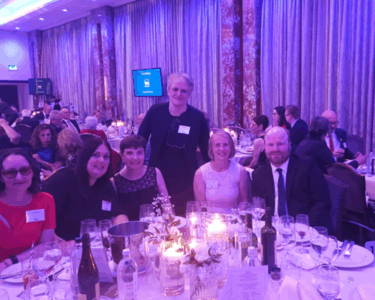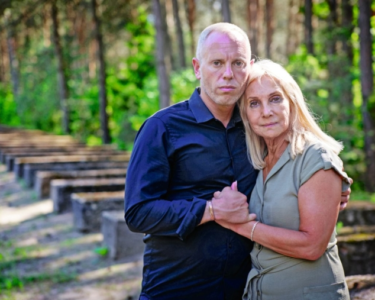We are delighted to support the launch of a major new international publication ‘Addressing Anti-Semitism in Schools: Training Curricula’. We believe this important initiative will make a significant and timely contribution to efforts within school, educational and training settings to respond to the malignant threat of antisemitism.
The Centre’s Executive Director, Professor Stuart Foster said:
‘I am privileged to participate in this hugely significant UNESCO-OSCE international event. The launch of the curriculum materials and guidance comes at the end of three years of collaboration and consultation with colleagues across the world. I have no doubt that the curriculum framework, largely developed by specialists at the UCL Centre for Holocaust Education, has the potential to make a significant impact on addressing antisemitism in all its forms’.
The alarming rise of antisemitism threatens the security of Jewish communities and individuals around the world. In 2019 alone, antisemitic hate crimes increased by 13% in Germany and 14% in the United States and were at a record high in the UK. Against this worrying backdrop, our team are proud to have offered our expertise and collaborated with UNESCO and the Organization for Security and Co-operation in Europe (OSCE) Office for Democratic Institutions and Human Rights (ODIHR) to respond to these trends. The outcome of this partnership – the new resources ‘Addressing Anti-Semitism in Schools: Training Curricula’ – will provide critical support to teacher trainers and those educators in training.
The launch of these curricula, online on 24 November at 17.00 CET, is, sadly, timely. This year, the COVID-19 pandemic has spurred a new wave of antisemitic conspiracy theories, while studies in the United States and Europe have shown a proliferation of Holocaust denial and distortion both on- and offline. Education plays a crucial role in raising young people’s awareness of antisemitism and building their resilience to these harmful messages.
We know from over a decade of working with teachers and our ‘Beacon School’ partners that schools are not immune to messages and acts of hate. UNESCO and ODIHR’s new publications aim to prepare teachers and school directors/SLTs to prevent antisemitism through teaching and learning and address it when it arises in education environments. Divided into four distinct volumes, the new publication includes targeted curricula for trainers of primary education teachers, secondary education teachers, vocational education teachers and school directors.
Supporting and developing these new resources as part of ODIHR’s Turning Words into Action to Address anti-Semitism project and within the framework of UNESCO’s programme on Global Citizenship Education has been a privilege for Centre colleagues – principally Ruth-Anne Lenga, Arthur Chapman and Dr Andy Pearce. The new publication is based on UNESCO and ODIHR’s guidelines for policymakers on ‘Addressing anti-Semitism through Education’ published in 2018. It is informed by desk research, surveys, interviews and a series of capacity-building workshops in 2019, which reached policymakers from more than 60 countries. These meetings in Paris, Minsk, Vilnius, Bratislava, Geneva and London allowed UCL Centre for Holocaust Education colleagues to draw upon the insights and rich, diverse experiences of international partners. This is reflected throughout the guidance and materials – each designed to provide research informed curricula, pedagogic and safeguarding support.
The Centre’s Programme Director, Ruth-Anne Lenga said:
‘It has been a great privilege to have worked with OSCE/ODHIR on this important project. Now more than ever, with increasing antisemitism in both cyberspace and real space, this curriculum framework, which trains pre-service teachers on how to recognise and address antisemitism, is a critically important development. Ministries of education across the world and those involved in education policy-making need to get behind this publication and support its implementation in their nation states if they mean business and are committed to supporting teachers in tackling antisemitism through education.’
Dr Arthur Chapman said of the project:
‘Our work is premised on the importance of knowledge. Combatting antisemitism, hatred and prejudice requires teachers to develop: (1) self-knowledge, as professionals, of their values, contexts and obligations; (2) content knowledge about antisemitism and prejudice; and (3) pedagogic knowledge with which to plan proactively and also to respond effectively to critical incidents. The Words into Action teacher training curriculum and resources were developed through research and wide consultation with subject and pedagogic experts from around the OSCE.’
The curricula follow a human rights-based approach and provides pedagogical knowledge with concrete activities, thus strengthening learners’ understanding of antisemitism, critical thinking, and overall resilience against prejudice and discrimination. Each volume includes a comprehensive list of good practices as well as examples of scenarios and methodological suggestions. Adding to the publication, the USC Shoah Foundation UNESCO Chair on Genocide Education is developing a website that will link the curricula to existing online teaching resources.
The full curricula can be accessed via the following links:
- Addressing anti-Semitism in schools: training curriculum for primary education teachers
- Addressing anti-Semitism in schools: training curriculum for secondary education teachers
- Addressing anti-Semitism in schools: training curriculum for vocational education teachers
- Addressing anti-Semitism in schools: training curriculum for school directors
The online launch on 24 November will feature statements by Katarzyna Gardapkhadze, Officer-in-Charge of the OSCE ODIHR, Stefania Giannini, UNESCO Assistant Director General for Education, and Ambassador Michaela Küchler, International Holocaust Remembrance Alliance Chair. A panel discussion will focus on ‘The role of education in addressing antisemitism’ with the participation of Maram Stern, Executive Vice President of the World Jewish Congress, Sharon Nazarian, Senior Vice President of International Affairs at ADL, Professor Stuart Foster, Executive Director of the University College London Centre for Holocaust Education, and moderated by Stephen Smith, Executive Director of the USC Shoah Foundation and UNESCO Chair for Genocide Education. The framework curricula will be introduced by Ruth-Anne Lenga, Programme Director, and Arthur Chapman, Associate Professor in History Education of the University College London Centre for Holocaust Education.



